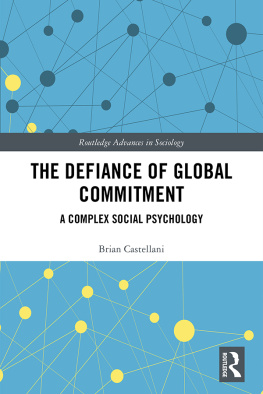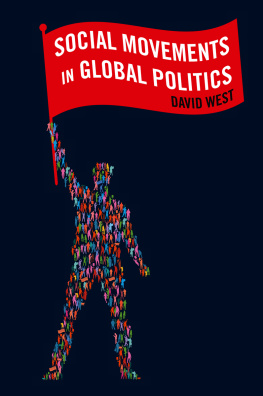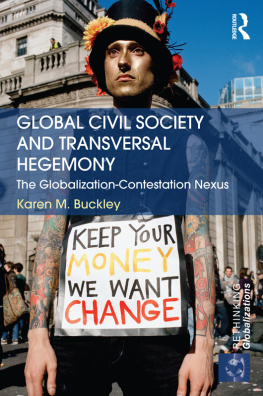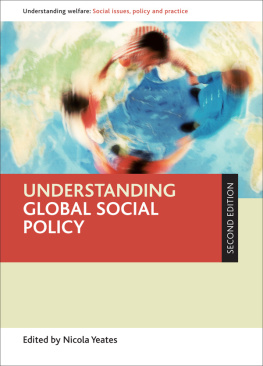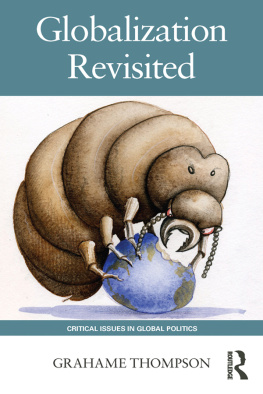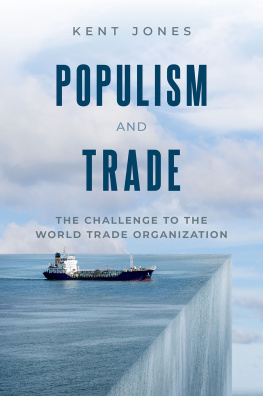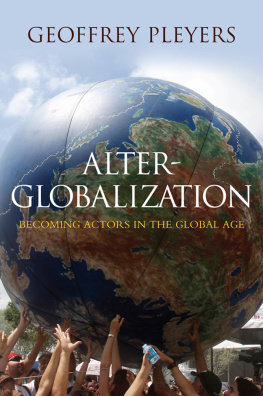Table of Contents
Pages
The Defiance of Global Commitment
The Brexit vote; the election of Trump; the upsurge of European nationalism; the devolution of the Arab Spring; global violence; Chinese expansionism; disruptive climate change; the riotous instabilities of the world capitalist system. While diverse in nature, these events share a common denominator: they are less a failure of policy, and more a complex social psychological reaction to globalization, the result of which presently threatens our survival on Earth.
Based on a critical reading of Freuds Civilization and its discontents, The defiance of global commitment constructs a complex social psychology of how people all over the world are addressing globalization. Drawing on the latest advances in the cognitive, social, and complexity sciences, this timely volume presents a global model of defiance and the triangular tensions between nostalgic retreat, global aggression, and civil society, as manifested in forms ranging from nostalgic resentment and LGBTQI issues to racism and ecological aggression.
Revealing how globalization and its discontents manifest the darker reaches of the human psyche and its conflicted relations with others, this insightful monograph will appeal to undergraduate and postgraduate students, as well as post-doctoral researchers, interested in fields such as globalization studies, complexity sciences and social psychology.
Brian Castellani, Professor of Sociology, Kent State University, USA; and Adjunct Professor of Psychiatry, Northeast Ohio Medical University, USA.
Routledge Advances in Sociology
For a full list of titles in this series, please visit www.routledge.com/series/SE0511
Mass Shootings in Comparative Perspective
Communities and Shared Experiences in the Aftermath
Johanna Nurmi
Mega-Events as Economies of the Imagination
Creating Atmospheres for Rio 2016 and Tokyo 2020
Rodanthi Tzanelli
Senses In Cities
Experiences Of Urban Settings
Edited by Kelvin E.Y. Low and Devorah Kalekin-Fishman
Shared Housing, Shared Lives
Everyday Experiences Across the Lifecourse
Sue Heath, Katherine Davies, Gemma Edwards and Rachael M. Scicluna
Helicopter Parenting and Boomerang Children
How Parents Support and Relate to Their Student and Co-Resident Graduate Children
Anne West and Jane Lewis
New Directions in Elite Studies
Edited by Johan Heilbron, Felix Bhlmann, Johs. Hjellbrekke, Olav Korsnes, and Mike Savage
Reflections on Knowledge, Learning and Social Movements
Historys Schools
Edited by Aziz Choudry and Salim Vally
Social Generativity
A relational paradigm for social change
Edited by Mauro Magatti
The Live Art of Sociology
Cath Lambert
The Defiance of Global Commitment
A Complex Social Psychology
Brian Castellani
The Defiance of Global Commitment
A Complex Social Psychology
Brian Castellani

First published 2018
by Routledge
2 Park Square, Milton Park, Abingdon, Oxon OX14 4RN
and by Routledge
711 Third Avenue, New York, NY 10017
Routledge is an imprint of the Taylor & Francis Group, an informa business
2018 Brian Castellani
The right of Brian Castellani to be identified as author of this work has been asserted by him in accordance with sections 77 and 78 of the Copyright, Designs and Patents Act 1988.
All rights reserved. No part of this book may be reprinted or reproduced or utilized in any form or by any electronic, mechanical, or other means, now known or hereafter invented, including photocopying and recording, or in any information storage or retrieval system, without permission in writing from the publishers.
Trademark notice: Product or corporate names may be trademarks or registered trademarks, and are used only for identification and explanation without intent to infringe.
British Library Cataloguing in Publication Data
A catalogue record for this book is available from the British Library
Library of Congress Cataloging in Publication Data
A catalog record for this book has been requested
ISBN: 978-0-815-35317-1 (hbk)
ISBN: 978-1-351-13714-0 (ebk)
Typeset in Times New Roman
by Wearset Ltd, Boldon, Tyne and Wear
Contents
PART I
Oceanic feeling and the pursuit of happiness
PART II
Globalization: a complex social psychology
PART III
Idstincts/drive and repression/resistance
PART IV
Sex, aggression, and death
Figures
Acknowledgement
To my Dad.
Many of the ideas in this book come from my Dads unpublished writings and sermons (my Dad was a Lutheran minister) and endless discussions we had, which almost always took place while fishing, walking in the woods, eating at local dive-diners, or working in his woodshop. Two of the first intellectuals to whom he introduced me, when I was still a teenager, were Freud and Kierkegaard. While the latter always eluded me, Freud always made perfect sense.
Later, when I majored in psychology as an undergraduate and then went on to graduate work in clinical psychology, I could never grasp the outright hostility folks had toward Freuds work. Granted, there is a lot Freud and his colleagues got wrong, such as his libidinal theory of development and his views on gender and sexual identity. Still, it seemed unscientific to dismiss the work of Freud and the early psychoanalytic movement entirely. I mean, people do not tear down and disparage Newton because he got some things wrong, such as time. Psychological science (including psychoanalysis) is supposed to evolve through empirically driven and engaging disagreement, not blindly held ideological dismissal.
I would talk with my Dad about such things, and he would always come back to the same basic point: Freudian theory and psychoanalysis are necessary but insufficient explanations of human behavior; other ideas, and lots of them, are needed; science (which is not a singular view) often needs to free itself from the past in order to take its multiple and diverse steps into the future; all ideas are underdetermined by their evidence; nobody owns truth! But, such realizations should not lead one to throw the proverbial baby out with the bathwater! Read Freud critically, my Dad would argue, and use and expand his ideas into new ways of thinking.
And so I did, and in the process, starting in my twenties, I moved on to a whole new world of thinking. For example, I found my own path in terms of religion, as I always found Greek myth and secularism more interesting; and I also always found the social commitments of secularism more pluralistic and open-minded. (But that is just me.) I also moved on in terms of my scholarly ideas, turning to the work of (in alphabetic order) such thinkers as David Byrne, Fritjof Capra, Paul Cilliers, Norman Denzin, Michel Foucault, Erving Goffman, Patricia Hill Collins, Richard Rorty, Jean-Paul Sartre, Anselm Strauss, Francisco Varela, Max Weber, and Cornell West, to name a fewwhich challenged me to embrace a whole new world of scientific and academic viewpoints, including moving on from clinical psychology to do doctoral work in medical sociology and, eventually, positioning my thinking and research within the complexity sciences. But always, I would find myself coming back to Freud.

